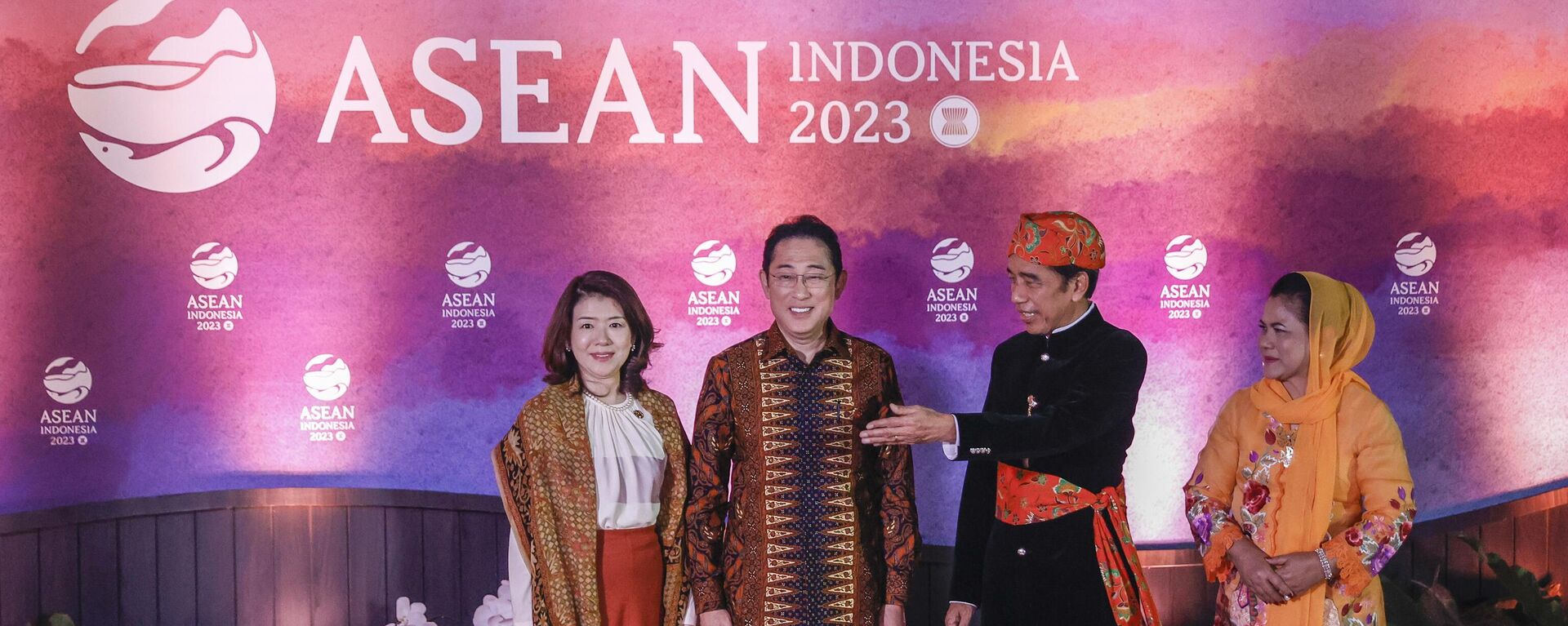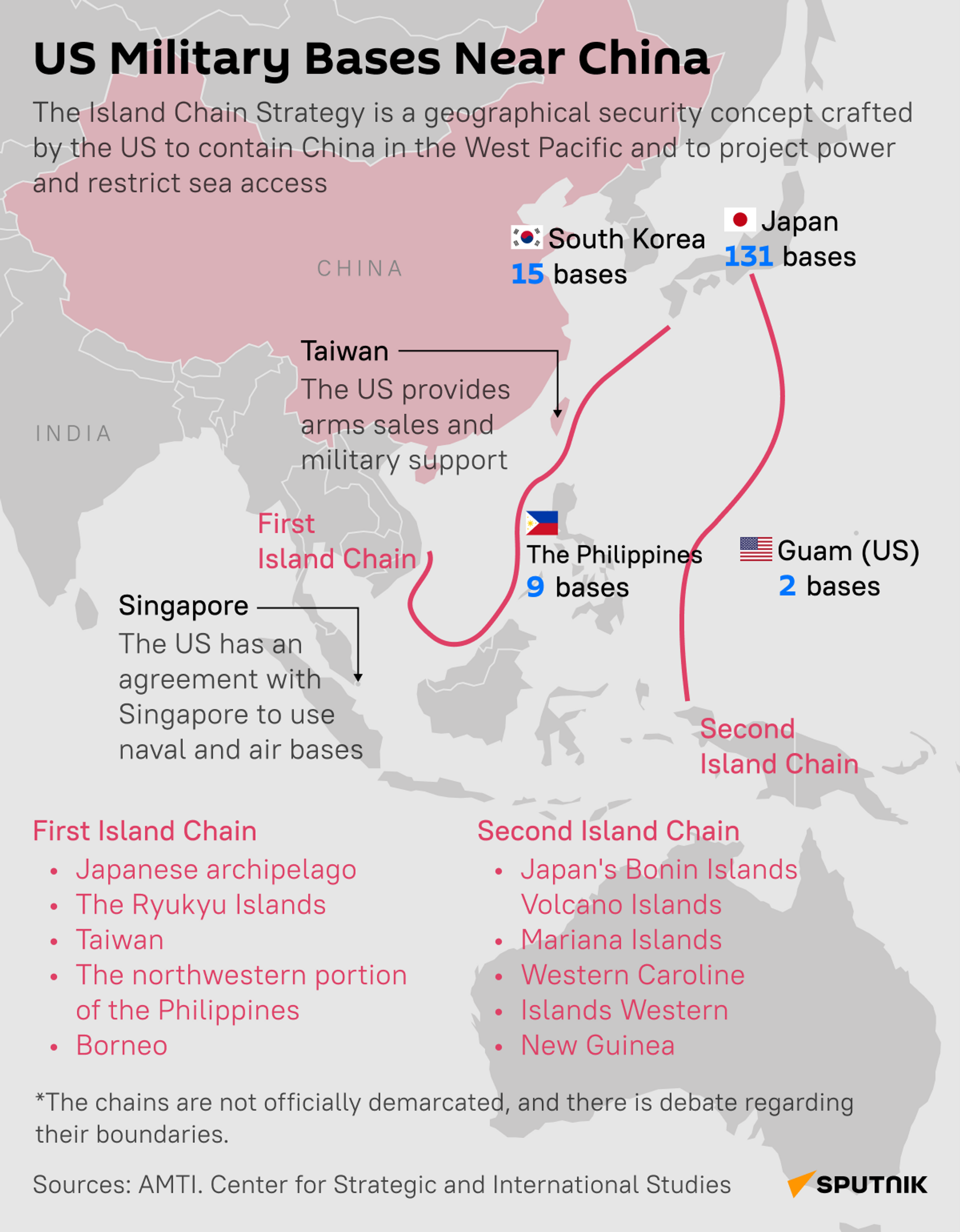https://sputnikglobe.com/20230909/vietnam-on-a-diplomatic-tightrope-can-biden-align-hanoi-against-china-1113238320.html
Vietnam on a Diplomatic Tightrope: Can Biden Align Hanoi Against China?
Vietnam on a Diplomatic Tightrope: Can Biden Align Hanoi Against China?
Sputnik International
President Biden is arriving in Hanoi on Sunday, with Vietnam and the US reportedly planning to sign a “comprehensive strategic partnership agreement” of a kind similar to one the Asian nation already has with Russia and China. What should be expected from Biden’s trip? Sputnik reached out to a veteran expert in regional affairs for details.
2023-09-09T18:56+0000
2023-09-09T18:56+0000
2023-09-10T12:08+0000
analysis
vietnam
china
hanoi
asean
intel
joe biden
nguyen phu trong
visit
cooperation
https://cdn1.img.sputnikglobe.com/img/07e7/08/1c/1112940303_0:0:3334:1876_1920x0_80_0_0_609e4cdf813372a022ccd1bd5838be74.jpg
During his two-day trip to Vietnam, Joe Biden will meet with Vietnamese Communist Party General Secretary Nguyen Phu Trong “and other key leaders to discuss ways to further deepen cooperation” between Washington and Hanoi, the US Embassy in Hanoi said in a statement put out this week.Behind the scenes, sources told media Saturday that Biden and other US officials will be accompanied during the trip by representatives of major US tech and aerospace companies, including Intel, Google, GlobalFoundaries, Amkor, Marvell, and Boeing, with Washington looking to boost Vietnam’s footprint in its tech-related supply chains amid escalating China-US trade and tech wars, and tensions over Taiwan.Intel, Amkor, and other American companies have already established a presence in the country, and US officials say the companies are eager to expand their operations. Boeing, meanwhile, is expected to announce a possible deal on the sale of 50 737 MAX airliners to Vietnam, according to officials.Per media reports, Vietnam and the US may also sign a “comprehensive strategic partnership agreement” during Biden’s visit to further ramp up economic, trade, technology, and security cooperation between the erstwhile enemies.The warming of Vietnamese-US ties marks a stark turnaround in relations in the wake of the brutal US-led war in the Southeast Asian nation between 1955 and 1975, in which up to 3.8 million Vietnamese and 58,000 US servicemen were killed, and much of the country’s land area devastated by bombing and toxic defoliants, whose horrific impacts continue to be felt to this day.Ahead of Biden’s visit, and the broader American strategic play to surround China with military bases, Beijing urged Washington to “give up the zero sum game and Cold War mentality,” and refrain from “targeting any third party” or “undermining regional peace, stability, development and prosperity.”Vietnam holds a strategic position at the southern end of the so-called First Island Chain - part of the American doctrine of strategic maritime containment of China first developed by former Secretary of State John Foster Dulles in the early 1950s aimed at denying the People's Republic the ability to project power in its own backyard.What’s Biden’s Game?The US effort to woo Vietnam is related partly to the country’s status as a “very dynamic” economic “powerhouse” in Southeast Asia, and partly to its potential to serve US geopolitical interests, Dr. Dewi Fortuna Anwar, a scholar from the Indonesia-based National Research and Innovation Agency’s Research Center for Politics, told Sputnik.Just as important for the US is security engagement, which “cannot be divorced from the situation in the South China Sea,” where Vietnam and China have competing claims, Anwar said.The US “looks to Vietnam as a country that was able to stand up both to [itself] and China in the past and is expected to be able to strengthen its capacity also to be much more firm in protecting its interests in the maritime domain, despite the fact that China is also the most important economic partner for Vietnam,” the scholar noted.Recalling the souring of Vietnamese-Chinese relations during the second half of the 20th century, particularly following Vietnam’s presence in Cambodia to oust Pol Pot and the short-lived Vietnamese-Chinese border war in 1979, Dr. Anwar stressed that after the Cold War ended and both countries began to open their economies, they became key economic partners, a relationship which has endured to this day.Vietnam on a Diplomatic TightropeHighlighting the independent security policy being pursued by most Asian and Southeast Asian powers vis-à-vis China, the US and other major powers, Dr. Anwar downplayed the implications of Biden’s efforts to woo Hanoi, and the idea that Washington can turn the country it once sought to destroy into a pawn.“We have good relations with all of the major powers in the region for different reasons. China is the most important economic partner for all of the ASEAN states, including Indonesia. But the United States is considered to be also a very important partner, economically also, but increasingly on security issues. So Vietnam is joining this kind of what you might call ‘hedging policy,’” Anwar suggested.“I think ASEAN as a whole…has stated its position,” Anwar said, referring to the 10-member Association of Southeast Asian Nations bloc, which held its latest summit in Indonesia this week. “It doesn’t want to be forced to choose one side or the other. It doesn’t want to be part of any bloc against another. ASEAN stresses the importance of cooperation rather than confrontation and emphasizes an inclusive regional architecture. And Vietnam is very much part of that ASEAN family,” the observer summed up.
https://sputnikglobe.com/20230907/faces-of-2023-asean-summit-in-indonesia-1113170390.html
vietnam
china
hanoi
Sputnik International
feedback@sputniknews.com
+74956456601
MIA „Rosiya Segodnya“
2023
News
en_EN
Sputnik International
feedback@sputniknews.com
+74956456601
MIA „Rosiya Segodnya“
Sputnik International
feedback@sputniknews.com
+74956456601
MIA „Rosiya Segodnya“
united states, visit, vietnam, joe biden, us, china, people's republic, partnership, security cooperation, status, tensions, south china sea
united states, visit, vietnam, joe biden, us, china, people's republic, partnership, security cooperation, status, tensions, south china sea
Vietnam on a Diplomatic Tightrope: Can Biden Align Hanoi Against China?
18:56 GMT 09.09.2023 (Updated: 12:08 GMT 10.09.2023) President Joe Biden is set to arrive in Hanoi on Sunday, with Vietnam and the US reportedly planning to sign a “comprehensive strategic partnership agreement” of a kind similar to one the Asian nation already has with China and Russia. What can be expected from Biden’s trip? Sputnik reached out to a veteran expert in regional affairs for details.
During his two-day trip to Vietnam, Joe Biden will meet with Vietnamese Communist Party General Secretary Nguyen Phu Trong “and other key leaders to discuss ways to further deepen cooperation” between Washington and Hanoi, the US Embassy in Hanoi said in a
statement put out this week.
“The leaders will explore opportunities to promote the growth of a technology-focused and innovation-driven Vietnamese economy, expand our people-to-people ties through education exchanges and workforce development programs, combat climate change, and increase peace, prosperity, and stability in the region,” the press release added.
Behind the scenes, sources
told media Saturday that Biden and other US officials will be accompanied during the trip by representatives of major US tech and aerospace companies, including Intel, Google, GlobalFoundaries, Amkor, Marvell, and Boeing, with Washington looking to boost Vietnam’s footprint in its tech-related supply chains amid escalating China-US trade and tech wars, and tensions over Taiwan.
Intel, Amkor, and other American companies have already established a presence in the country, and US officials say the companies are eager to expand their operations. Boeing, meanwhile, is expected to announce a possible deal on the sale of 50 737 MAX airliners to Vietnam, according to officials.
Per media reports, Vietnam and the US may also sign a
“comprehensive strategic partnership agreement” during Biden’s visit to further ramp up economic, trade, technology, and security cooperation between the erstwhile enemies.
The warming of Vietnamese-US ties marks a stark turnaround in relations in the wake of the brutal US-led war in the Southeast Asian nation between 1955 and 1975, in which up to
3.8 million Vietnamese and 58,000 US servicemen were killed, and much of the country’s land area
devastated by
bombing and toxic defoliants, whose horrific impacts continue to be felt to this day.
Ahead of Biden’s visit, and the broader American strategic play to surround China with military bases, Beijing urged Washington to “give up the zero sum game and Cold War mentality,” and
refrain from “targeting any third party” or “undermining regional peace, stability, development and prosperity.”Vietnam holds a strategic position at the southern end of the so-called First Island Chain - part of the American doctrine of strategic maritime containment of China first developed by former Secretary of State John Foster Dulles in the early 1950s aimed at denying the People's Republic the ability to project power in its own backyard.
The US effort to woo Vietnam is related partly to the country’s status as a “very dynamic” economic “powerhouse” in Southeast Asia, and partly to its potential to serve US geopolitical interests, Dr. Dewi Fortuna Anwar, a scholar from the Indonesia-based National Research and Innovation Agency’s Research Center for Politics, told Sputnik.
“Vietnam’s economic growth is very impressive and Vietnam has been able to carry out various internal reforms to make it very, very agile in responding to the economic opportunities. When, for example, a trade war was started between the United States and China, Vietnam has been able to take advantage of the relocations of some industries, including from the United States,” the academic said.
Just as important for the US is security engagement, which “cannot be divorced from the situation in the South China Sea,” where Vietnam and China have competing claims, Anwar said.
The US “looks to Vietnam as a country that was able to stand up both to [itself] and China in the past and is expected to be able to strengthen its capacity also to be much more firm in protecting its interests in the maritime domain, despite the fact that China is also the most important economic partner for Vietnam,” the scholar noted.
Recalling the souring of Vietnamese-Chinese relations during the second half of the 20th century, particularly following Vietnam’s presence in Cambodia to oust Pol Pot and the short-lived Vietnamese-Chinese border war in 1979, Dr. Anwar stressed that after the Cold War ended and both countries began to open their economies, they became key economic partners, a relationship which has endured to this day.
Vietnam on a Diplomatic Tightrope
Highlighting the independent security policy being pursued by most Asian and Southeast Asian powers vis-à-vis China, the US and other major powers, Dr. Anwar downplayed the implications of Biden’s efforts to woo Hanoi, and the idea that Washington can turn the country it once sought to destroy into a pawn.
“So there’s no permanent friends and permanent enemies in international relations, there are only permanent interests…Vietnam is behaving like many other Southeast Asian countries, like many other Asian states,” she said, pointing out, for example, that her native Indonesia similarly adheres to strategic nonalignment, while simultaneously enjoying comprehensive strategic partnerships with China, Russia, and the US.
“We have good relations with all of the major powers in the region for different reasons. China is the most important economic partner for all of the ASEAN states, including Indonesia. But the United States is considered to be also a very important partner, economically also, but increasingly on security issues. So Vietnam is joining this kind of what you might call ‘hedging policy,’” Anwar suggested.
She added that Vietnam, like other countries in the region, will continue to try to play a careful balancing act to “ensure their individual and regional strategic autonomy,” and avoid becoming “overdependent on any side. That's why Vietnam [signed] a comprehensive strategic partnership with China. And that is going to stay, I think.”
“I think ASEAN as a whole…has stated its position,” Anwar said, referring to the 10-member Association of Southeast Asian Nations bloc, which held its
latest summit in Indonesia this week. “It doesn’t want to be forced to choose one side or the other. It doesn’t want to be part of any bloc against another. ASEAN stresses the importance of cooperation rather than confrontation and emphasizes an inclusive regional architecture. And Vietnam is very much part of that ASEAN family,” the observer summed up.

7 September 2023, 16:23 GMT






